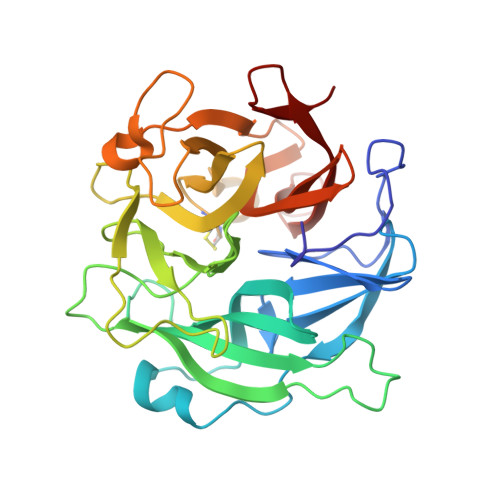Crystal structure of an inverting GH 43 1,5-alpha-L-arabinanase from Geobacillus stearothermophilus complexed with its substrate
Alhassid, A., Ben-David, A., Tabachnikov, O., Libster, D., Naveh, E., Zolotnitsky, G., Shoham, Y., Shoham, G.(2009) Biochem J 422: 73-82
- PubMed: 19505290
- DOI: https://doi.org/10.1042/BJ20090180
- Primary Citation of Related Structures:
3CU9, 3D5Y, 3D5Z, 3D60, 3D61 - PubMed Abstract:
Arabinanases are glycosidases that hydrolyse alpha-(1-->5)- arabinofuranosidic linkages found in the backbone of the pectic polysaccharide arabinan. Here we describe the biochemical characterization and the enzyme-substrate crystal structure of an inverting family 43 arabinanase from Geobacillus stearothermophilus T-6 (AbnB). Based on viscosity and reducing power measurements, and based on product analysis for the hydrolysis of linear arabinan by AbnB, the enzyme works in an endo mode of action. Isothermal titration calorimetry studies of a catalytic mutant with various arabino-oligosaccharides suggested that the enzyme active site can accommodate at least five arabinose units. The crystal structure of AbnB was determined at 1.06 A (1 A=0.1 nm) resolution, revealing a single five-bladed-beta-propeller fold domain. Co-crystallization of catalytic mutants of the enzyme with different substrates allowed us to obtain complex structures of AbnBE201A with arabinotriose and AbnBD147A with arabinobiose. Based on the crystal structures of AbnB together with its substrates, the position of the three catalytic carboxylates: Asp27, the general base; Glu201, the general acid; and Asp147, the pKa modulator, is in agreement with their putative catalytic roles. In the complex structure of AbnBE201A with arabinotriose, a single water molecule is located 2.8 A from Asp27 and 3.7 A from the anomeric carbon. The position of this water molecule is kept via hydrogen bonding with a conserved tyrosine (Tyr229) that is 2.6 A distant from it. The location of this molecule suggests that it can function as the catalytic water molecule in the hydrolysis reaction, resulting in the inversion of the anomeric configuration of the product.
Organizational Affiliation:
Institute of Chemistry, The Hebrew University of Jerusalem, Jerusalem, Israel.















